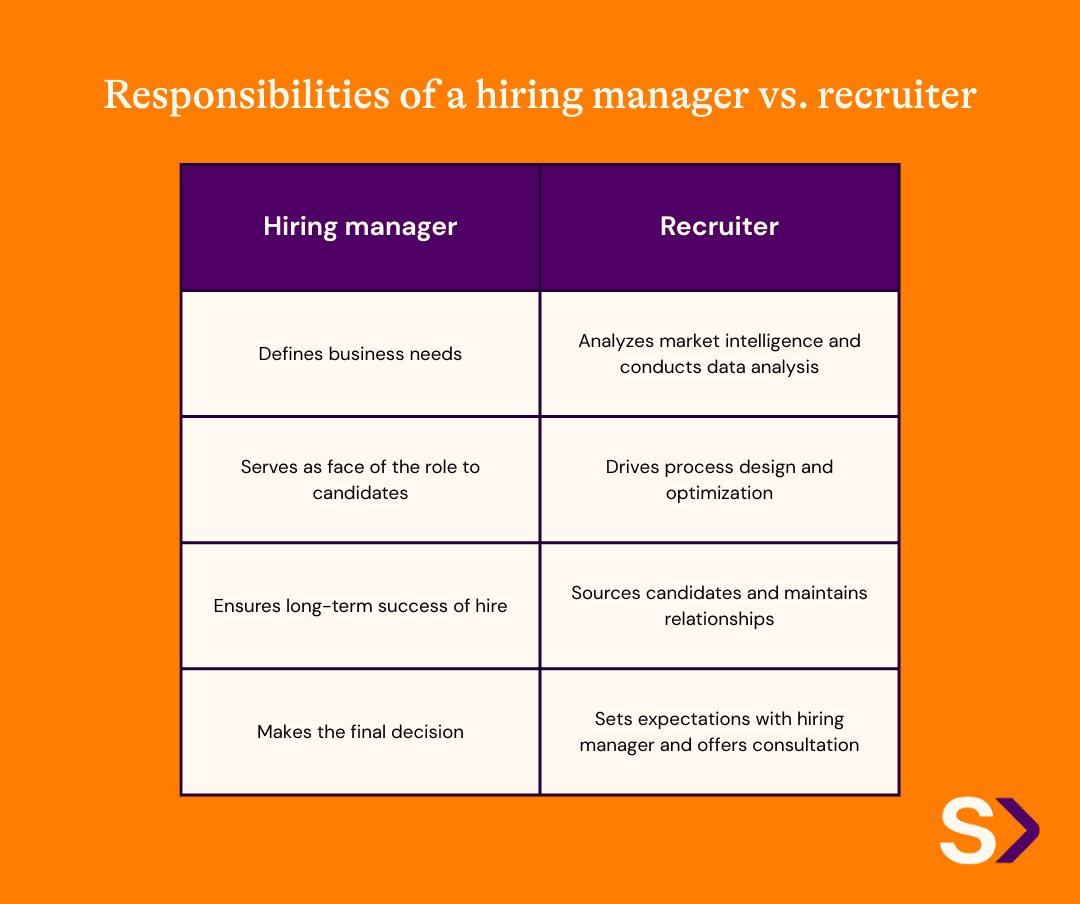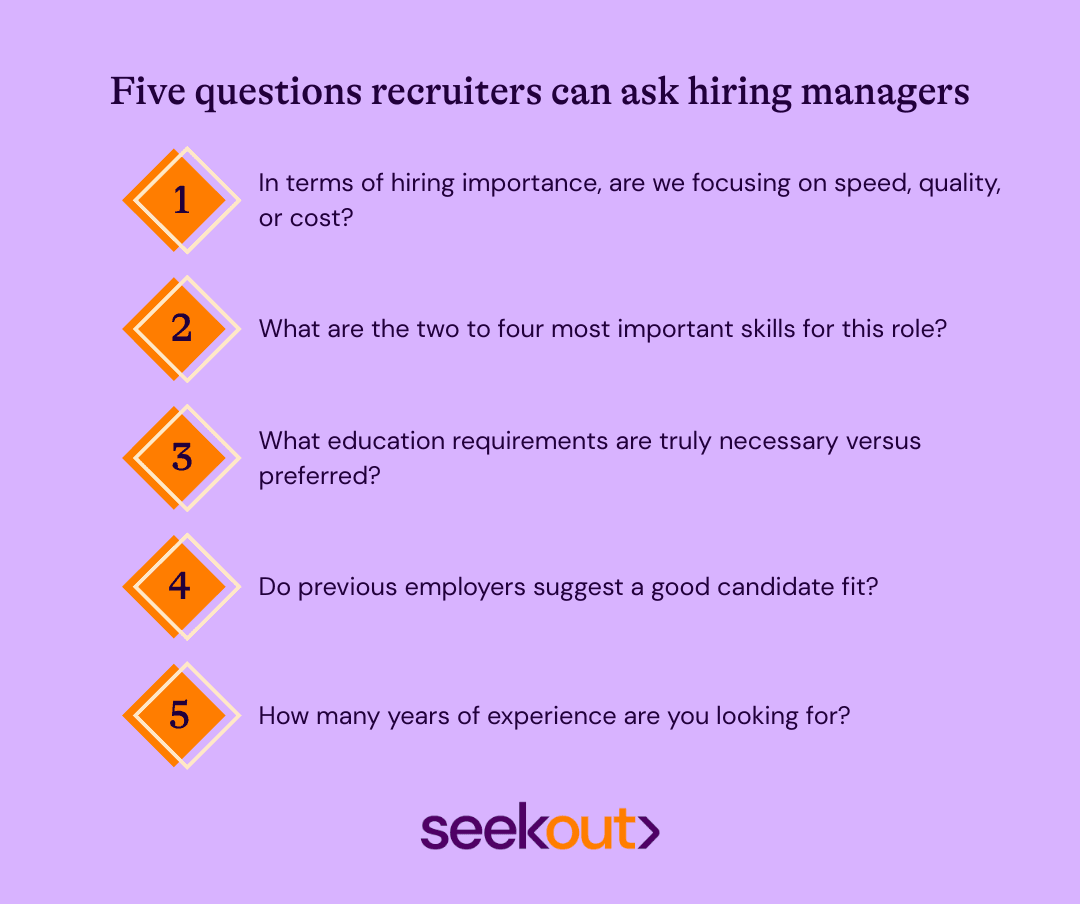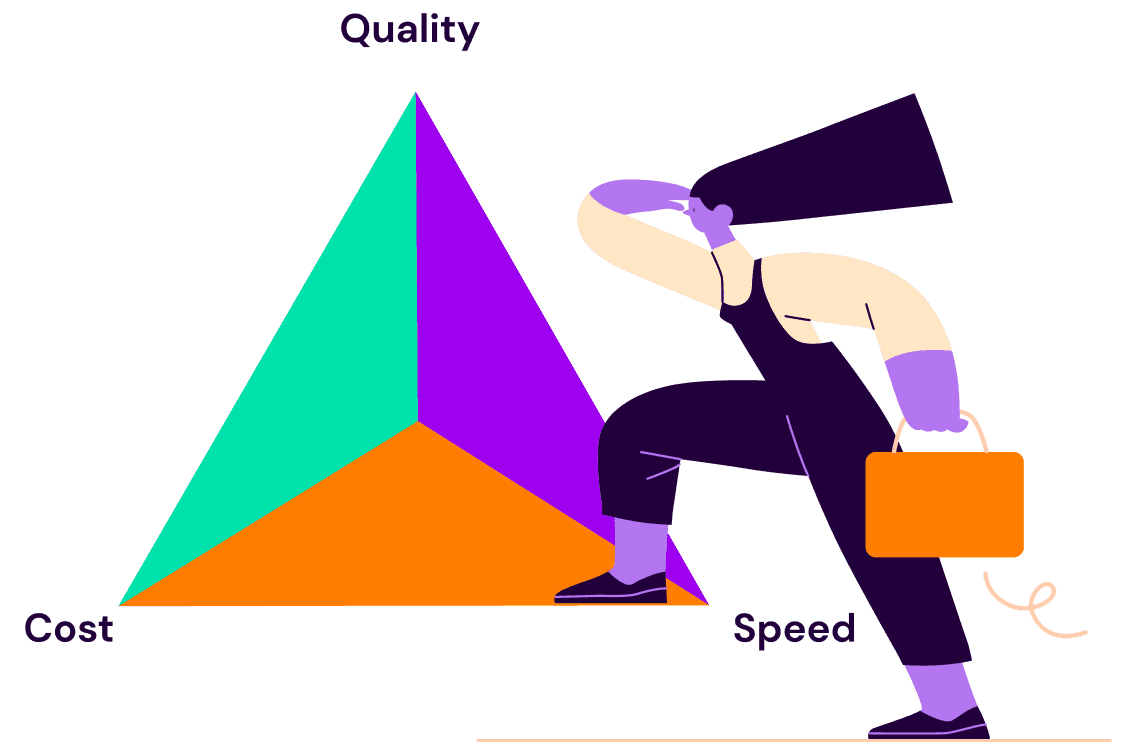
Back to blogs

Hiring Managers and Recruiters: Building a Partnership that Leads to Quality Candidates
The partnership between hiring managers and recruiters is critical to successful hiring, yet many organizations struggle to get this relationship right. There's often a lack of understanding about each other's roles, which can create friction and inefficiency that draws out the hiring process.
Hiring managers and recruiters collaborate best when they combine their strengths. With clear communication and expectations, they make decisions faster and can bring in candidates who fit business needs.
Ahead, you'll learn the differences between hiring managers and recruiters, how both roles can show up for one another, and how this partnership impacts your business outcomes.
What does a hiring manager do?
“Hiring managers are the true owners of the open role,” says Christina Vidauri, Principal Recruiter at SeekOut. “They will ultimately make the hiring decision.”
Hiring managers are accountable for the role’s success or failure in ways that shape how they deliver on business goals. They understand how each role fits into their team's larger mission and what skills are needed to move projects forward.
A hiring manager’s core responsibilities include:
Defining the business need. Hiring managers know their team's current gaps better than anyone. They understand which projects require specific expertise, what daily challenges need solving, and how a new hire will integrate with existing team members. "If they don't fulfill these needs, they won't be able to meet their goals,” adds Elsa Moreno, Principal Talent Advisor at SeekOut. “It can have critical implications in the overall state of the business."
Representing the role to candidates. During interviews, hiring managers serve as the face of the role and the team. They share the vision for the position and help candidates understand what success looks like.
Ensuring long-term success. Hiring managers are often the direct manager of the hire. Unlike recruiters who move on to the next search, hiring managers live with their hiring decisions. They're responsible for onboarding, developing, and retaining the people they choose.
Making the final decision. While recruiters guide the process and provide market insights, hiring managers ultimately choose who joins their team. They evaluate technical skills, as well as things like cultural fit and how candidates will contribute to team dynamics.
Hiring managers are focused on leading their teams and delivering on business priorities day-to-day, which means they don't have the bandwidth to stay current on market trends or talent availability. They know what they need, but they might not realize what's realistic to find or how to attract it. That's where their partnership with recruiters becomes essential.
What does a recruiter do?
Recruiters are the talent market experts who bring external perspective and process expertise to every hire. They source candidates and act as strategic advisors, helping organizations and hiring managers navigate the complexities of recruiting.
"I am here to inform and provide feedback," says Christina. "I do not expect every hiring manager to know all hiring best practices and techniques, and I hope that they trust me as a subject matter expert to create a structured process that is inclusive and equitable."
Recruiters serve as the bridge between what companies need and what the market can provide.
A recruiter's core responsibilities include:
Market intelligence and data analysis. Recruiters stay current on salary trends and talent availability across industries. They may use tools like SeekOut to reliably surface this data.
Process design and optimization. From creating inclusive job descriptions to structuring interview workflows, recruiters ensure hiring processes are efficient, fair, and candidate friendly.
Candidate sourcing and relationship building. Recruiters maintain networks of both active and passive candidates. They know how to reach people who aren't actively looking but might be perfect for the right opportunity.
Expectation setting and consultation. When hiring managers want the perfect candidate, recruiters can offer what's realistic. They help refine requirements based on what's available and achievable.
Manage candidate experience. Recruiters are often the candidates' primary point of contact, guiding them through the process and ensuring they have a positive experience regardless of the outcome.
Good to know: In-house vs. outsourced recruiters |
|---|
In-house recruiters bring deep company culture knowledge and long-term relationship building with hiring managers. They understand internal processes and what makes candidates successful within the organization over time. Outsourced recruiters, like those through our SeekOut Spot service, offer broader market perspective across multiple companies and specialized expertise in specific roles or industries. They bring fresh perspective on hiring challenges and act as a scalable resource when hiring needs shift. Both types share the same core mission of combining market expertise with process knowledge to help companies make better hiring decisions faster. |
Differences between the hiring manager and recruiter in the hiring process
Hiring managers and recruiters approach the goal of making a successful hire from different angles.
"I think of recruiting as the engine and the hiring manager as the driver," explains Christina. "I keep things moving and can adjust the speed as needed, but the hiring manager has to steer and pay attention."
Each role brings unique strengths that, when combined, create a more comprehensive and effective approach to finding the right talent.

The recruiter as the guide
Process navigation. Recruiters lead hiring managers through proven workflows and best practices. They know which interview structures yield the best results and when to adjust timelines based on market conditions.
Market reality checks. Recruiters provide data-driven feedback to help hiring managers understand what compensation ranges will attract quality candidates and how long searches may take.
Candidate pipeline management. Recruiters handle sourcing, initial screening, and candidate communication. They maintain momentum by keeping qualified prospects engaged while coordinating schedules and logistics.
Timeline accountability. Recruiters track progress and identify bottlenecks before they derail searches. They know when to push for faster decisions and when to allow for thorough evaluation.
Elsa emphasizes that recruiters can guide busy or indecisive hiring managers to stay on track. When candidates aren't moving forward due to hiring manager delays or indecision, she suggests asking: "How much is your business losing by keeping this role open?"
This data-driven approach grabs attention and opens dialogue about process improvements. "The key is to be compelling in your communication, not confrontational," says Elsa. "Show that you're willing to work with them to unblock whatever may be the bottleneck, whether it's candidate quality, interview structure, or something else."
The hiring manager as the vision holder
Establish role requirements. Hiring managers are closest to the day-to-day realities of the role and how the position fits into larger team dynamics and business objectives.
Culture and team fit assessment. During interviews, hiring managers evaluate how candidates will integrate with existing team members and handle the specific challenges their organization faces.
Technical and role-specific evaluation. Hiring managers assess competencies that only someone doing similar work would understand. They can spot potential red flags or exceptional capabilities that might not be obvious to recruiters.
Fine-tuning the search together
There's rarely a perfect job description from the start. Requirements evolve as the recruiter and hiring manager learn more about what's available in the market and what candidates are looking for.
Recruiters bring market intelligence that helps hiring managers adjust expectations, while hiring managers provide context that helps recruiters focus their search more effectively. This back-and-forth refinement process prevents the dreaded "purple squirrel" syndrome, where teams search endlessly for candidates with impossible skill combinations.
Why strong hiring manager and recruiter relationships lead to strong hires
The most successful hiring outcomes happen when hiring managers and recruiters operate as true partners. This shared accountability impacts every aspect of the hiring process:
Faster decision-making. When hiring managers trust their recruiters' screening abilities, decisions move faster. Instead of reviewing every resume, they can focus on the most promising candidates.
Better candidate quality through combined expertise. Hiring managers know team dynamics and role requirements but might not understand current market realities. Recruiters understand talent availability but need context about what success looks like. Together, they create a more comprehensive evaluation.
Consistent candidate experience. When both roles are aligned on messaging, timeline expectations, and company positioning, candidates receive a coordinated experience. Inconsistencies create confusion and can cause strong candidates to withdraw.
Sample questions recruiters can ask hiring managers in the kick-off meeting
A great way to set the foundation for a solid partnership is for recruiters to show up prepared. This will help align expectations and positions recruiters as strategic advisors.
"I show up with the job description highlighted and dissected and a list of questions,” says Christina. “I also research the team and pull example profiles of possible candidates.”
Here are a few sample questions to help avoid unrealistic requirements and ensure both parties understand what success looks like:

1. In terms of hiring importance, are we focusing on speed, quality, or cost?
This question sets expectations and impacts process design. Understanding the business drivers behind the urgency allows recruiters to structure their approach accordingly. For example, if speed is critical, the process needs streamlined decision-making. If quality is a priority, more thorough evaluation stages may be necessary.
2. What are the two to four most important skills for this role?
Job descriptions don't always tell the full story. This question helps focus the search by highlighting skills that matter most for success. Keep the conversation clear and specific—you don't need to cover everything, just the few things that really make someone a fit.
Recruiter tip |
|---|
"Don’t be an order taker,” advises David Li, Principal Talent Advisor at SeekOut. “You’ll end up searching for a unicorn candidate if you just take down every requirement they list. This question will help you push back on unrealistic skill requirements, and you can use data to back it up.” |
3. What education requirements are truly necessary versus preferred?
Many roles don't actually require specific degrees. Educational requirements can inadvertently limit candidate diversity and exclude qualified candidates who learned their skills through different paths. Focus on what someone can do rather than where they learned it.
4. Do previous employers suggest a good candidate fit?
If certain companies or industries signal a strong match, this provides valuable context for sourcing more relevant candidates. Use this information for guidance rather than strict requirements that might limit the talent pool.
5. How many years of experience are you looking for?
Most teams should only set a minimum experience requirement. Adding a maximum can limit your talent pool and unintentionally exclude qualified candidates, especially those with more experience who may still be a great fit and bring additional value.
These sample questions strengthen recruiter–hiring manager alignment. If you’re also looking for inspiration on what to ask candidates during interviews, see our guide on strategic interview questions to ask candidates.
The long-term value of a strong partnership between hiring managers and recruiters
Strong hiring partnerships are business critical, not just a nice to have. When hiring managers and recruiters work in true collaboration, companies see measurable improvements: faster time-to-fill, better candidate quality, and stronger long-term retention. The investment in building this relationship pays dividends in every hire that follows.
Book now
Request a meetingFrequently Asked Questions
What’s the difference between a hiring manager and a recruiter?
A hiring manager owns the open role and makes the final hiring decision, while a recruiter manages the process—sourcing, screening, and guiding candidates through each stage. Recruiters provide market insights and structure, and hiring managers bring role-specific expertise and vision. Together, they make faster, more informed hiring decisions.
Why is collaboration between hiring managers and recruiters important?
When hiring managers and recruiters work together, they combine deep team knowledge with market intelligence. This partnership shortens time-to-fill, improves candidate quality, and creates a more consistent candidate experience. Misalignment between the two can cause delays, confusion, and missed opportunities with top talent.
How can recruiters and hiring managers communicate more effectively?
Effective communication starts with a structured kick-off meeting. Recruiters should come prepared with market data, sample candidate profiles, and clarifying questions about priorities—like whether the search should optimize for speed, quality, or cost. Clear expectations early on prevent miscommunication later in the process.
What are some common challenges between hiring managers and recruiters?
Common friction points include unrealistic candidate expectations, slow decision-making, unclear feedback, or mismatched priorities. These can lead to longer hiring cycles and poor candidate experiences. Establishing accountability, regular check-ins, and shared metrics helps avoid these issues.
How does a strong recruiter–hiring manager relationship improve candidate quality?
Strong partnerships lead to more aligned searches. Recruiters understand what success looks like in the role, while hiring managers gain a realistic view of the talent market. This alignment ensures candidates are not only technically qualified but also a strong fit for team culture and long-term goals.
What questions should recruiters ask hiring managers before starting a search?
Recruiters should clarify the role’s top priorities, must-have skills, and desired outcomes. Questions about hiring urgency, education requirements, team culture, and realistic experience levels help refine the search. This step ensures recruiters target the right candidates from the start.
What are the long-term benefits of improving hiring manager–recruiter alignment?
Stronger partnerships improve every metric that matters: faster time-to-fill, higher candidate quality, and better retention. Over time, these teams build trust, communicate more efficiently, and create hiring processes that scale with business growth.
See us in action
Learn how SeekOut unifies people data to help organizations reach their talent goals
Request a demo



